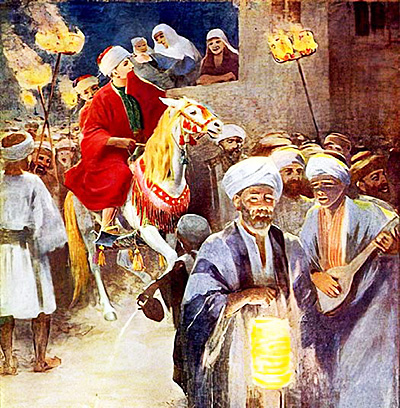Can you remember anticipating Christmas as a child? I remember looking forward to all the joys of the season with eager expectation. On Christmas Eve my brother and I could hardly sleep.
I still am one to look forward to the next family gathering or special occasion. I get excited anticipating future blessings — although I’ve learned better how to appreciate the moment I’m in too. You may also be looking forward to significant life events, like the birth or marriage of a child or grandchild, a new job, a move or a getaway vacation. But have you ever wondered what Jesus is looking forward to?
We know that He has eternal fellowship with God the Father and the Holy Spirit and is in need of nothing. Yet, I am convinced that He is eagerly anticipating an event that will soon come to pass.
The Jewish Wedding
When Jesus was on earth, He frequently taught using parables. Sometimes it was to mask certain revealed truth from those without spiritual discernment (Matthew 13:13). Other times, the parable itself was meant to convey deeper truth with even greater clarity. Jesus spoke in the language of the people He interacted with and used examples from their own life experiences.
To the fishermen of Galilee, He called them to be fishers of men. To the people who understood how grain would be sown on the hills of northern Israel, he talked about scattering seed on various kinds of ground. But when it came to a description of the end-times, He chose to reference a Jewish wedding to teach important truths (Matthew 25:1-13).
Throughout Israel, but in Galilee in particular, a wedding was a singularly important event. A man would select a young woman to propose a covenant of marriage. She was under no compulsion and could accept or deny that proposal. If she accepted, she would drink from a cup of wine offered by the betrothed bridegroom. This action on her part sealed the marriage covenant, but the marriage had to await consummation.
The groom would return to his father’s house to begin enlarging the structure to accommodate his new bride and their eventual family. The bride would return to her own home to await the day when she would be gathered to the groom — being careful to maintain her purity and her preparedness. Joseph and Mary were in this stage when Mary was found to be with child, which is why her unexpected pregnancy would have been so scandalous.
As eager as the two young people would have been to be together, they had no control over the timing of their eventual unity. The groom’s father was the sole decider authorized to declare the time was right. That could have been based on the son’s progress in making preparations, his discernment that separation would make the hearts grow fonder or any number of considerations. But at a moment determined by him alone, the father would tell the son, “Go and get your bride.”

“Behold, the Bridegroom Cometh” by The English painter, James Clark (1858-1943). (Public Domain)
The Bridegroom Cometh
The son would blow a shofar — alerting the entire town (and his bride) that he was on his way to collect her. His groomsmen would accompany him, and the bride would eagerly await his arrival. When the groom finally arrived at the bride’s home, she would be swept away — literally carried aloft by the groomsmen back to the groom’s home and the place he had prepared for her. This was called “flying the bride.”
Of course, the attendants and family and friends would be welcomed into the groom’s home to celebrate in a marvelous wedding feast. And, the bride and groom — who had loved and longed for each other for many weeks or months — would finally consummate their marriage.
Jesus knew that His listeners would understand the inherent joy in a Jewish wedding. Every man who had been a groom and every woman who had been a bride recognized the significance of that joyous moment. And every young maiden who had served as another bride’s attendant discerned the importance of being ready to join the procession.
Teachers of Bible prophecy have long recognized the symbolism in Jesus’ reference to the Jewish wedding in His teachings. He is the Bridegroom who has proposed a covenant relationship. His bride is the Church — those who have accepted His proposal and are betrothed to Him. From the moment that covenant is made, our Groom is committed to us — and we are set apart (made holy) for Him by Him (Revelation 19:7-8). But, just like a Jewish groom, Jesus has returned to His Father’s house to prepare a place for us (John 14:1-4).
At some point in human history, God the Father will say to the Son, “Go, and get your Bride.” When He does, Jesus will not tarry any longer. He will gather the angels of Heaven as His attendants and emerge from Heaven to collect His Bride. The dead in Christ (Church-Age saints who have already passed) will rise from the grave to meet Him in the air. And then we who are alive will also be caught up — changed in the twinkling of an eye — to join them. All who are in the Church will fly away to the Father’s house to be unified with Christ. As the Bible says, “and so we shall always be with the Lord” (1 Thessalonians 4: 6-17).
After a period of judgment of our works to determine special rewards, we will celebrate the Marriage Supper of the Lamb, rejoicing over our union with our Bridegroom. Meanwhile, those left behind on earth will find that lawlessness multiplies exponentially during the Tribulation after the Church is removed.
A God’s Eye View
Ever since becoming a pilot, I’ve marveled at the way your perspective changes when you leave the surface of the earth. We live largely two-dimensional lives, moving to and fro and left and right throughout the day. We orient by cardinal directions on the compass — north, south, east and west. As a result, our field of view is inherently limited.
But when you soar in the air, you’re able to see much farther than you ever could on the ground. Whereas a motorist may not know that around the next bend a traffic jam awaits, a pilot can see the highway for many miles in both directions. Pilots call this elevated and enhanced perspective a “bird’s eye view” or a “God’s eye view.” No disrespect is meant; to the contrary, it is an affirmation that only God alone can see with absolute clarity beyond every horizon that limits our human vision.
With that in mind, it is appropriate to consider at times the flow of events surrounding the end-times from the Lord’s perspective. So again, relative to the Rapture, what is Jesus looking forward to?
Most of us look at the Rapture from the perspective of the Bride. That is a fitting viewpoint, because those of us who have really put our faith in Jesus are in the Church that is the Bride of Christ. We can reflect on all the promises made to us and look forward to the arrival of our Bridegroom — something Scripture actually commands us to do.
But Jesus is the Bridegroom. And, although He is seated at the right hand of God the Father and has need of nothing to be complete in His perfection, I believe that He is eager to collect His Bride. He is patiently submissive to the Father but like any earthly groom, He is filled with anticipation as He waits. He knows the joys that await His Bride and is eager to welcome her to the place He has prepared. He is excited about the marriage feast where the marriage covenant will be celebrated. And, He simply longs to be united with those who are His forevermore.
How About You?
If you can accept that Jesus is excited about collecting His Bride and awaits His Father’s command with eager anticipation, my only question is this: Are you? Are you excited about being with Jesus? Do you eagerly await the trumpet that will announce His approach? Are you joyfully serious about maintaining your purity, preparing yourself and staying alert and ready to be with Him?
I pray that you are. I also hope that if you’ve realized the joy that awaits us as believers, you’ll share that good news with others. It’s been said that every bride glows with inner beauty as her wedding day approaches. The joyous anticipation radiates out of her for all to see.
As we await our glorious Bridegroom, let’s capture that sense of anticipation and joy. May our love for Jesus fill our hearts to overflowing and radiate out of us every hour of every day. We have this promise: Soon and very soon, the Father will say to the Son, “Go and get your bride.”
Godspeed!








As a Jewish believer in Jesus, I was converted 32 years ago, being led by the “Hound of Heaven” to worship the true and living God. I found this article to be moving and excellent. I would say that many of the symbols of Judaism never resonated with the deep symbolism noted in the article before I was saved. Only when I came to Christ as my Lord and Savior did the deeper meaning of some of the symbols like the shofar or the lamb take on a profound spiritual meaning such as are noted in this article. (How about “the seven trumpet judgments” or “Behold the Lamb of God who takes away the sin of the world”?) Blessings, Jeffrey